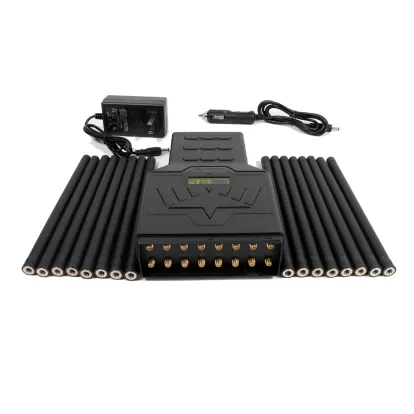The implementation of cellphone jammers within the country's correctional institutions does not fully deter incarcerated criminals from sending messages to individuals outside the prison walls.
This is the view of senior prison officials who tell the Sunday Express that even though the jammers (which they say are operational) are used to block signals from cellphones within the prisons, other interception technologies are needed for the system to be effective.
The deployment of cellphone jammers is evident, yet their efficacy is maximized when utilized in conjunction with other technologies such as Wi-Fi jammers. This correlation has been observed in various jurisdictions, but its full utilization is yet to be realized in our current setting.

Prisoners will possess cellphones and tablets, but they will not have the ability to make traditional phone calls. Nevertheless, they can utilize the device's data or, if they have access to a hot-spot device or a Wi-Fi box, they will be able to make calls through social media apps like WhatsApp, Facebook, and Instagram. Thus, the matter of communicating with the outside world remains unresolved. Communication is still ongoing.
“In other jurisdictions, you will see the cellphone jammers being used with other interception devices to determine the frequencies used by these devices, and then target those specific frequencies. If this is not done, then it’s almost like spinning top in mud,” a senior source in the Prison Service explained yesterday.
Furthermore, according to the Sunday Express, the signal blockers used and operated within the Prison Service grounds are under the control of a third party.
Acting Prisons Commissioner Deopersad Ramoutar evaded direct answers to the questions raised about the effectiveness of the cellphone jammers. He justified his response by claiming that such information is privileged and does not fall within the realm of the Prison Service's responsibilities.
It was revealed by other senior officials to the Sunday Express that they are still operational.
In the Maximum Security Prison located in Arouca, a Wi-Fi box was found and confiscated along with other prohibited items.
The officers were provided with specific information that directed them to the cells within the B Division of the prison.
Extensive searches were conducted, ultimately leading to the discovery and confiscation of a bag in a designated cell adjacent to the toilet area. The bag contained 53 grammes of marijuana, as well as cellphones and the Wi-Fi box.
In a distinct cell, law enforcement officers located and seized a bag containing 104 packs of cigarettes and marijuana, which had a cumulative weight of 241 grams.
The items that were confiscated were reportedly owned by two prisoners.
The use of drones over prisons has raised concerns among prison officers, as expressed on Friday. A senior officer highlighted the gravity of this issue, referring to it as a potential "ticking time bomb" that necessitates prompt resolution.
A single drone that goes unnoticed can result in a highly alarming situation. This drone may be equipped to drop knives or even firearms, posing a significant threat. Although our seizures have primarily consisted of contraband items like cigarettes, marijuana, phones, and chargers, the failure to intercept just one drone can create a very perilous environment within the prison and for the entire country.
As per Ramoutar's statement, the Prison Service has observed a notable increase in the usage of drones around correctional facilities, particularly over the past year, prompting them to take appropriate action.
Through the utilization of different sectors within the National Security portfolio, he asserted that most of the items that were tossed over prison walls were confiscated before they could be acquired by the inmates.


 留言列表
留言列表


